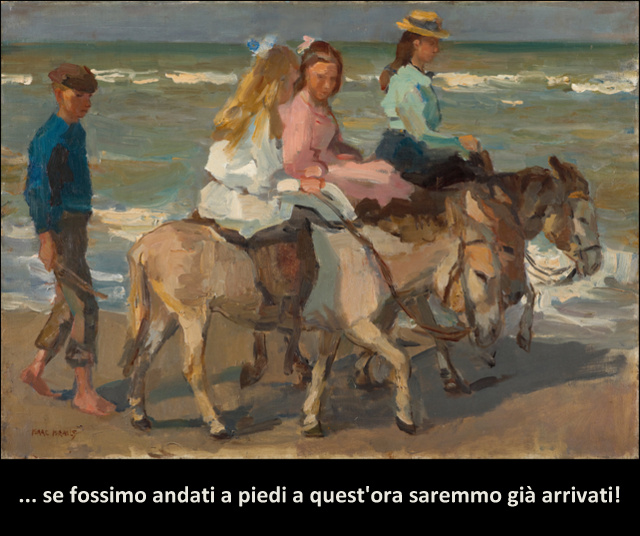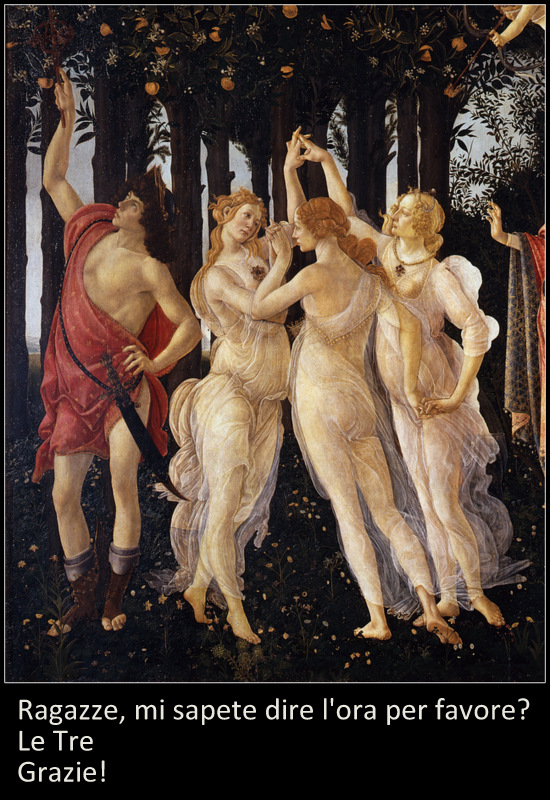Non Vedo l’Ora! Posted by Geoff on Jan 15, 2016 in Italian Language
Non vedo l’ora! (literally: I can’t see the hour) is a very common expression meaning ‘I can’t wait!’ or = ‘I’m really looking forward to’
It can be used as an exclamation on its own:
Giorgio: vieni a vedere la mia raccolta di antiche pistole domani? = Giorgio: are you coming to see my collection of antique pistols tomorrow?
Paolo: sì, non vedo l’ora! = Paolo: I can’t wait!
… or with ‘di‘ and an infinitive to describe what you can’t wait to do:
non vedo l’ora di visitare Firenze! = I’m really looking forward to visiting Firenze
non vedo l’ora di veder il mio ragazzo questo fine settimana! = I can’t wait to see my boyfriend this weekend!
It can, of course, be used to express what other people can’t wait to do:
scommetto che non vedi l’ora di provare la nuova macchina, vero? = I bet you can wait to try the new car, right?
le ragazze non vedono l’ora di aprire i regali! = the girls are really looking forward to opening the presents!
Ora Vs Tempo
N.B. in Italian, tempo means both time and weather! Hence we very often use ora instead of tempo when we’re talking about the time. Look at the difference between these two example:
che ora è? = what time is it?
che tempo fa? = what is the weather like?
Here are some more important examples in which ora is used instead of tempo:
è ora di andare = it’s time to go
era ora che tu finissi quel lavoro! = it was about time that you finished that job!
ora solare = winter time (relating to the changing of the clock by one hour between wintertime and summertime)
ora legale = summer time (as above)
ora di pranzo = lunch time
ora di cena = dinner time
ore dei pasti = mealtimes
alla stessa ora or all’ora solita = at the same time/at the usual time
a quest’ora = at/by this time e.g. se fossimo andati a piedi a quest’ora saremmo già arrivati = if we’d gone by foot we would have got there by this time, ci vediamo domani a quest’ora = I’ll see you tomorrow at this time.
Girls, can you tell me the time please?
The Three
Graces!
–
Now do you get it? 😉
Finally, here are the answers to the short quiz at the end of How To Tell The Time In Italian. You were asked to translate the following replies to the question che ore sono? into Italian
1. it’s eight twenty five = sono le otto e venticinque
2. it’s a quarter past nine = sono le nove e un quarto
3. it’s twenty to eleven = sono le undici meno venti
4. it’s half past noon/midday = è mezzogiorno e mezza/o (both endings are used)
5. it’s nine thirty five (give two possible variations) = sono le nove e trentacinque or sono le dieci meno venticinque or manca venticinque alle dieci
6. it’s three forty (give three possible variations) = sono le tre e quaranta or manca venti alle quattro or sono le quattro meno venti (N.B. you could also say mancano venti minuti alle quattro)
7. This shop will close at seven thirty p.m. Questo negozio sarà chiuso alle diciannove e trenta
8. The next train for Pisa departs at five twenty five p.m. Il prossimo treno per Pisa parte alle diciassette e venticinque
9. The bus from Lucca arrives at six thirty a.m. L’autobus da Lucca arriva alle sei e trenta

Build vocabulary, practice pronunciation, and more with Transparent Language Online. Available anytime, anywhere, on any device.






Comments:
Mike Jolly:
Come al solito un blog interessante e utile. Vi ringrazio per aver fatto così tanta fatica. Forse un altro blog su il congiuntivo prego nel futuro.
Grazie mille
Mike
Teresa Alvarado:
I’m learning Italian. Thanks a lot for sharing and It really helps me a lot.
God bless you.
Natalia:
These posts on modi di dire are really useful. Grazie
Anna:
Geoff, about the three Graces: pardon me, but I’m Italian, yet it took me quite a while to “get it” . I think it needs an explanatory note. Or, very possibly, I’m just too dumb. Do you know, by the way, that this kind of wordplay is called a “freddura”?
I was an abused child; often, when I asked my mother
“Che ora è?” the heartless creature would reply , fast, very fast: “È l’ora che era ieri a quest’ora, né più tardi né più di buon ‘ora.”
“Di buon’ora”, as you know, means “early in the day”, not to be confused with “alla buon’ora!” (always spoken and usually written with an exclamation mark) , meaning “at last!”, but with a sarcastic nuance, implying that it is actually too late, for the speaker’s patience at least. More or less the same as “Era ora!” ( it was time)
On quiz 4: another way of saying it’s 12.30 is, simply “È la mezza.”
On quiz 5: you never use the form – next hour minus minutes – before twenty to. 9.39= sono le nove e trentanove; 9.40= sono le nove e quaranta/sono le dieci meno venti.
On quiz 7: “Questo negozio chiude alle diciannove e trenta” is the form you’ll mostly meet, if its regular closing time is meant. If it’s just the once, “Martedì 26 gennaio questo negozio chiuderà alle 19.30”. “Questo negozio sarà chiuso alle 19.30” on the other hand, I would understand as meaning either that the shop closes no later than 19.29, or that it will be shut down for good, never to re-open, at 19.30.
Geoff:
@Anna Salve Anna, non sono Italiano, ma la ‘freddura’ l’ho capita subito … figurati!
Mi piace la risposta di tua mamma, anche la mamma di Serena (mia moglie) faceva la stessa battuta. Parlando di Serena, adesso te la passo che risponde lei alle tue altre osservazioni, visto che è lei che ha scritto il piccolo quiz, va bene? Eccola:
Domanda 4: “È la mezza” è un’espressione tipica toscana, ma poco conosciuta nelle altre regioni, per questo motivo non l’ho messa nel post.
Domanda 5: hai scritto “you never use the form – next hour minus minutes – before twenty to”. Forse è vero nella lingua parlata di tutti i giorni, ma non è certamente la regola. Mi ricordo ancora che a scuola (e io ho fatto tutta la mia carriera scolastica in scuole italiane), la maestra portò un orologio di legno diviso a metà verticalmente in due colori: “Per i minuti che vanno dalle 12 alle 6 si dice ‘e’ (3.27 = le tre e ventisette), dalle 6 alle 12 si dice ‘meno’ (2.35 = le tre meno venticinque)” ci insegnò la maestra.
Domanda 7: Boh?! Ne devo parlare con Enzo, il manager del supermercato dove vado normalmente per sapere cosa volesse dire.
Saluti da Geoff e Serena